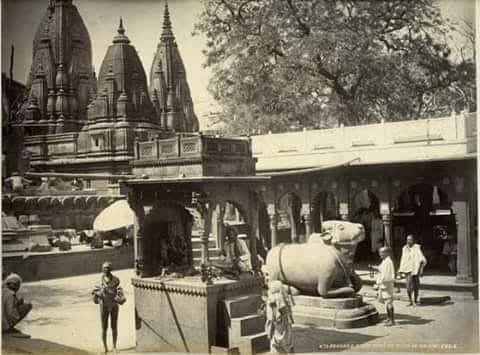Gyanvapi Mosque Case: The Gyanvapi mosque is situated adjacent to the renwoned Kashi Vishwanath temple caught into a controversy since centuries with Hindu groups alleging that the mosque was built by Mughal emperor Aurangzeb after demolishing structures of the Kashi Vishwanath temple in the 16th century while a few historians suggesting that the Gyanvapi mosque and the Kashi Vishwanath temple were built by Mughal emperor Akbar to spread awareness about his Din-e-Ilahi religious system.
Recently, the court-mandated videography survey of the Gyanvapi mosque complex completed, however, details of the survey were not disclosed.
Gyanvapi complex: The controversy
The controversy started in 1991 after a few local priests claimed that Aurangzeb demolished some parts of the Kashi Vishwanath temple – which was originally constructed by Maharani Ahilyabai Holkar of Malwa kingdom – to built the mosque. They sought permission to worship in the Gyanvapi complex and claimed idols of Hindu Gods are present there.
However, as the matter remained dormant, the hearing was suspended by the Allahabad High Court.
Gyanvapi complex: What do historians suggest?
Meanwhile, there are a few historians claiming that the Gyanvapi mosque and the Kashi Vishwanath temple were built by Mughal emperor Akbar to spread awareness about his Din-e-Ilahi religious system. However, others support claims that Aurangzeb demolished parts of the Kashi Vishwanath temple.
Historian Audrey Truschke in her book Aurangzeb: The Man and the Myth wrote, “My understanding is that the Gyanvapi masjid was indeed built during Aurangzeb’s reign. The masjid incorporates the old Viswanath temple structure — destroyed on Aurangzeb’s orders — as its qibla wall. While the mosque dates back to Aurangzeb’s period, we do not know who built it,” Truschke wrote.
“The Gyanvapi masjid still stands today in Benares with part of the ruined temple’s wall incorporated into the building. This reuse may have been a religiously clothed statement about the dire consequences of opposing the Mughal authority,” the writer added.
Gyanvapi controversy revival
Gyanvapi controversy was revived after the historic verdict of the Supreme Court in the year 2019 in connection with the Babri Masjid-Ram Janmabhoomi dispute. A petition was filed in the Allahabad High Court that sought a survey by the Archeological Survey of India (ASI) of the Gyanvapi masjid.
In 2021, another petition was filed by Delhi-based women, seeking permission to worship Hindu deities, whose idols are said to be located on the walls of mosque. They also sought instructions that idols of Hindu Gods should not be damaged.
Then in April 2022, Varanasi District Civil Court (Senior Division) judge Ravi Kumar Diwakar ordered a survey and videography at the mosque complex by the advocate commissioner. He also turned down a plea by the mosque committee to replace Ajay Kumar Mishra, who was appointed advocate commissioner by him to survey the Gyanvapi-Gauri Shringar complex.
Further, two more advocates were appointed to help the commissioner with the survey and said it should be completed by Tuesday.
The Muslim groups moved the Supreme Court against the survey however were left disappointed after the top court refused to grant an interim order of status quo on the survey.
After the three-day Gyanvapi Masjid survey concluded on Monday, a lawyer from the Hindu side in the case claimed that a Shivling had been found inside a wazukhana or reservoir on the mosque complex.
However, the mosque committee said that what was being claimed as a Shivling was actually a fountain.


